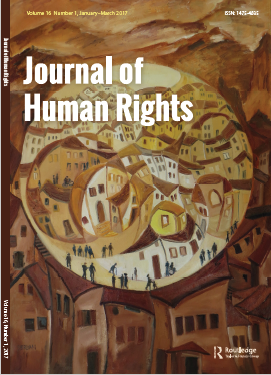
JHR’s new cover features an original piece of art titled, The Global Village, painted by artist Blanche Serban. You can see more of Blanche’s art on her website
Welcome to the Journal of Human Rights
The Journal of Human Rights seeks to broaden the study of human rights by fostering the critical re-examination of existing approaches to human rights, as well as developing new perspectives on the theory and practice of human rights. The journal aims to meet a globally growing interest in the study and practice of human rights by serving as an arena for the public discussion and scholarly analysis of human rights, broadly conceived.
Because the Journal is committed to theoretical and ideological diversity in the study of human rights, the editor welcomes papers from scholars and disciplines traditionally associated with the study of human rights as well as papers from those in other disciplines or fields of inquiry which have traditionally been under-represented in the field.
If you have any questions, please do not hesitate to contact us
For more information, to download articles, subscribe, or peruse past issues, please visit our official Taylor & Francis Homepage.
To Submit an Article or Book Review please click here:
http://mc.manuscriptcentral.com/cjhr.
Editorial Team
Shareen Hertel
University of Connecticut
Editor
Thomas Cushman
Wellesley College
Founder and Editor-at-Large
Catherine Buerger
University of Connecticut
Managing Editor
Sarita Cargas
University of New Mexico
Book Review Editor
Sandra Sirota
University of Connecticut
Book Review Editor
Rachel Chambers
University of Connecticut
Social Media Editor
Kelebogile Zvobgo
College of William & Mary
Social Media Editor
Ben Carbonetti
Trinity College
Data Editor
Special Issue News
Issue 22.1: The International Criminal Court at 25: Reassessing Processes and Outcomes
On July 17, 2023, the International Criminal Court (ICC) will mark the 25th anniversary of the adoption of the Rome Statute, its founding treaty. The Statute constituted a remarkable transfer of authority from sovereign states to an international institution: The ICC is the first permanent court charged with prosecuting individuals, including senior political and military leaders, for atrocity crimes. Per the Statute, the ICC was designed with the goals of ending impunity for these crimes, contributing to their prevention, and delivering justice to victims. To what extent has the ICC achieved these and other goals in the Rome Statute? The ICC’s upcoming anniversary provides an opportune moment to examine this question and take stock of the Court’s performance. This special issue of the Journal of Human Rights addresses this question from an empirical perspective, focusing on two themes: (1) the ICC’s relations with states, which critically condition its operations and impact, (2) the Court’s effectiveness in achieving the goals outlined in the Rome Statute, specifically ending impunity and mitigating violence.
Other specialized content
JHR 21.5 (Symposium on Governance Authority in Business & Human Rights)
JHR 21.3 (2nd Special issue on COVID-19)
JRH 21.2 (Special Issue on HR on the Edge – The future of International HR Law & Practice)
JHR 20.5 (Symposium on Political Apologies & HR)
JHR 20.2 (Special Issue on HR Governance in ASEAN)
Human Rights in the Time of COVID-19
Quantitative Human Rights Measures
Human Rights in Higher Education
Newsletter
Human Rights Methodology
Methods Focus
In issue 17.4, JHR introduced a new “Methods Focus” series where authors explore various methodological approaches to the study of human rights. The series highlights the breadth of research that we publish in JHR.
- Introducing the Methods Focus Series
- Victim Testimony and Transitional Justice
- Using Visual Images
- Expert Witnessing and Pragmatic Solidarity
- Literary Research: The War Novel
- Feminist periscoping in research on border enforcement and human rights
- Using Images as Data in Political Violence Research
JHR’s Quantitative Dataverse
JHR’s Quantitative Dataverse is a tool aimed at advancing quantitative human rights scholarship – an online portal (hosted through Harvard Dataverse) featuring all datasets associated with articles of this nature published in JHR. You can access the Dataverse site here: https://dataverse.harvard.edu/dataverse/jhr